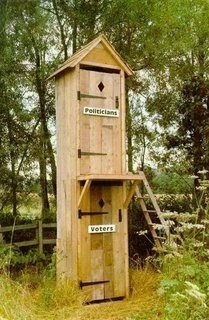
Over the next few weeks, some items I post here will be relating to issues that will be on the Colorado ballot on November 7th. Since most states will have similar issues, I feel there will be something relevant to most readers of
Lift That Torch, etc. In preparation of this series, I will post here the eighteen specific and enumerated powers granted to the Congress of the United States by the Constitution. Although most of the issues are to be voted on by the citizens of each state, and many pertain to the specific state's constitutional ammendments. However, the US Constitution is pertainant to these issues because it is relevent to the states, as is the Bill of Rights. It is important to remember, quoting Andrew Napolitano from his book,
The Constitution in Exile, that
any government which claims to give rights can take those rights away.The eighteen specific and enumerated limited powers of Congress granted by the Constitution:1. "The Congress shall have Power To lay and collect Taxes, Duties, Imposts and Excises, to pay the Debts and provide for the common Defense and general Welfare of the United States , but all Duties, Imposts, and Excises shall be uniform throughout the United States."
2. "To borrow Money on the credit of the United States; Congress may borrow money by issuing bonds or by other means."
3. " To regulate Commerce with foreign Nations, and among the several States, and with the Indian Tribes."
4. "To establish a uniform Rule of Naturalization, and uniform Law on the subject of Bnruptcies throughout the United States."
5. "To coin Money, regulate the value thereof, and of foreign Coin, and fix the
Standard of Weights and Measures."
6."To provide for the punishmentof counterfeiting the Securities and current Coin of the United States."
7. "To establish Post Offices and Post Roads.
8. "To promote the Progress of Science and useful Arts, by securing for limited Times to Authors and Inventors the exclusive Right to their respective Writings and Discoveries."
9. "To Constitute Tribunals inferior to the Supreme Court."
10. "To define and punish Piracies and Felonies commited on the High Seas, and Offences against the Law of Nations."
11."To declare War, grant Letters of Marquee and Reprisal, and make Rules concerning Captures on Land and Water.
12. "To raise and support Armies, vut no Appropriation of Money to that Use shall be for a longer Term than two years."
13. "To provide and maintain a Navy."
14. "To make Rules for the Government and Regulation of the land and naval forces."
15. "To provide for calling forth the Militia to execute the Laws of the Union, suppress Insurrections and repel Invasions."
16. "To provide for organizing, arming, and disciplining, the Militia, and for governing such Part of them as may e employed in the Service of the United States, reserving to the States respectively, the Appointment of Officers, and the Authority of training the Militia according to the disclipine prescribed byCongress."
17. "To exercise exclusive Legislation in all Cases whatsoever, over such District) not exceeding ten Miles square) as may, by Cession of particular States and the Acceptance of Congress, become the Seat of the Government of the United States, and to exercise like Authority over all Places pruchased by the Consent ofthe Legislature of the State in which the Same shall be, for the Erection of Forts, Magazines, Arsenals, dock-Yards, and other needful Buildings."
18. "To make all Laws which shall be necessary and proper for carrying into Execution the foregoing Powers, and all other Powers vested by this Constitution in the Government of the United States, or in any Department or Officer thereof."
Your homework assignment:
1. Where does it say that the government may apply a person's sexual preference in determining rights and privilages?
2. Where does it say that the government may regulate consentual commerce between two consenting individuals?
As a study aid, here are the Ninth, and Tenth Ammendments to the US Constitution, also known as the Ninth and Tenth Articles of the Bill of Rights:
9. The enumeration in the Constitution, of certain rights, shall not be construed to deny or disparage others retained by the people.
10. The powers not delegated to the United States by the Constitution, not prohibited by it to the States, are reserved to the States respectively, or to the people.

 This is a great day for the United States Air Force--it is dedication day for the Air Force Memorial in Washington, DC. As a former Air Force enlistee, it brings a great feeling of pride to me. Granted, my personal trials caused some problems for me, but if I could enlist and go through six years all over again, I would. Having been a member of the US Air Force means very much to me.
This is a great day for the United States Air Force--it is dedication day for the Air Force Memorial in Washington, DC. As a former Air Force enlistee, it brings a great feeling of pride to me. Granted, my personal trials caused some problems for me, but if I could enlist and go through six years all over again, I would. Having been a member of the US Air Force means very much to me.







